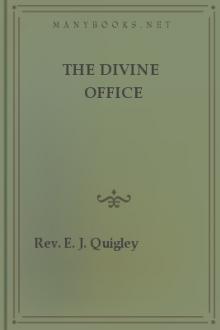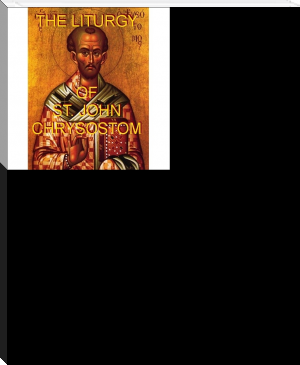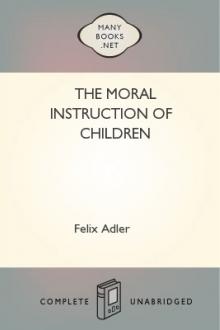The Divine Office by Edward J. Quigley (cool books to read .txt) 📕

- Author: Edward J. Quigley
- Performer: -
Book online «The Divine Office by Edward J. Quigley (cool books to read .txt) 📕». Author Edward J. Quigley
Suffrages of the Saints. (Title XXXV.) In Sec.2 of rubrics of the new Breviary we read, "Deinceps, quando facienda erunt suffragia sanctorum, unum fiet suffragium, juxta formulam propositam in Ordinario novi Psalterii." Thus were abolished the old formulae of suffrages and a new one inserted.
Antiphon Beata Dei Genitrix…. V. Mitificavit …. R. Et exaudivit….
Oremus, A cunctis….
This will be said at Lauds and Vespers outside Paschal time (1) on all Sundays and ferias, (2) on semi-doubles and simples, except (a) in Advent and Passiontide, (b) when there is a commemoration of a double, a day within an octave. In Paschal time the Commemoration is of the Cross.
In this prayer the names of the Holy Angels and of St. John the Baptist, if they be titulars, are inserted before the name of St. Joseph. At the letter N. in the prayer, the name of the titular saint of the particular church should be inserted; but churches dedicated by the title of a mystery (e.g., the Ascension) are not to be named in this prayer (S.R.C., March, 1912).
TEXTS AND INTENTIONS TO AID THE PIOUS RECITATION OF VESPERS.1. "Woman, behold thy Son; Behold Thy mother" (St. John, c. 19),
2. "I thirst" (St. John, c. 19).
3. "And they, putting a sponge full of vinegar about hyssop, put it to His mouth" (St. John, c. 19).
General Intentions. The conversion of sinners; the wants of the Church; those in death agony; spread of Eucharistic devotion; daily Communion; priest adorers; reparation for bad Communions; reparation for impieties and irreverences towards the Eucharist.
Personal Intentions. Regularity in visits to Blessed Sacrament; Fervour in Mass and in administering Holy Communion; a happy death; true and deep devotion to Mary.
Special Intentions. The Irish Daily Mass Crusade; Total Abstinence; devotion to the Passion; devotion to the agonising Heart of Jesus.
COMPLINE.Etymology and synonym. The word compline comes from the Latin word complere, to complete, to finish, because this Hour completes or finishes the day Hours of the Office. It bore several names, Completa (St. Isidore), Initium noctis (St. Columbanus), Prima noctis hora (St. Fructeux).
Antiquity. The origin of this Hour has given rise to a great deal of controversy. Both Baumer and Battifol in their histories of the Breviary attribute the origin of this Hour to St. Benedict (480-543). Other scholars attribute its origin to St. Basil, and hence date it from the fourth century. It is admitted that before the time of St. Basil, Bishop of Caesarea (370-379) this Hour was in existence. Some hold that St. Basil established the Hour in the East and St. Benedict in the West. The latter certainly invested the Hour with the liturgical character and arrangement which were preserved by the Benedictines and adapted by the Roman Church. The Compline of the Roman Church is more ornate and solemn than the liturgy assigned to this Hour by St. Benedict, which was very simple. The addition of the response In manus tuas Domine, the Nunc dimittis and its anthem of the Blessed Virgin make this Hour one of great beauty.
Structure, The structure of the Hour seems to point to its monastic origin, "The reader begins, 'Pray, Father, a blessing' (jube, domne benedicere); the blessing, 'The Lord Almighty grant us a quiet night and a perfect end. Amen.' 'Noctem quietam….' Then follows a short lesson, which the Father Abbot gave to his monks. 'Brethren, be sober and watch; because your adversary, the devil, as a roaring lion, goeth about, seeking whom he may devour, whom resist ye, strong in faith. But Thou, O Lord, have mercy on us.' And the monks answer 'Thanks be to God.' 'Fratres sobrii estote et vigilate….' Then the Pater Noster (silently), and the presiding priest, who was the Abbot or his deputy, said the confiteor and the choir answered Misereatur…. 'May Almighty God have mercy upon thee and forgive thee thy sins, and bring thee to life everlasting.' The choir then repeats the Confiteor and the priest replies 'Misereatur vestri….' 'May Almighty God have mercy upon you, forgive you your sins and bring you to life everlasting.'" Of course, in private recitation, or where two or three recite the Office, these prayers are said only once, and in the Confiteor, tibi pater and te pater are omitted, and nostri, nostris, nos, nostrorum, nobis, are said in the Misereatur and Indulgentiam.
Then the Converte nos Deus…. At averte iram tuam…. Deus in adjutorium…. Domine ad adjuvandum…. Gloria Patri…. Antiphon (begun only) and three psalms, which vary, are said, Gloria Patri…. Sicut erat… being said at the end of each. In manus tuas… is said twice. Redemisti nos. … Commendo spiritum meum; Custodi nos … sub umbra…. Salva nos; Nunc dimittis…. Gloria Patri, Salva nos Domine vigilantes, custodi nos… pace. (Preces are said here if rubric orders; i.e., Kyrie eleison, Christie eleison… ad te veniat); Dominus vobiscum, Et cum…. Benedicamus Domino, Deo gratias; Benedicat et custodiat nos omnipotens. Amen; then the anthem of the Blessed Virgin, Alma Redemptoris Mater (from Saturday before first Sunday of Advent to the feast of the Purification, inclusive) with its antiphon; in Advent, Angelus Domini, response, Et concepit, Oremus and prayer, Gratiam tuam, or with antiphon (after Advent) Post partum… and response, Dei genetrix, Oremus, Deus qui salutis. After the Purification, until Holy Thursday the anthem is Ave regina coelorum, with versicle Dignare me …, Da mihi, Oremus, Concedemisericors. From Holy Saturday until Saturday after Pentecost, the anthem is Regina coeli with versicle, Gaude… and response, Quia surrexit…. Oremus and prayer, Deus qui per resurrectionem. From Holy Trinity Sunday to the Saturday before Advent, the antiphon is Salve Regina with versicle, Ora pro nobis… response, Ut digni, Oremus and prayer, Omnipotens semipeterne Deus. Then the versicle Divinum auxilium…. Amen. Pater Noster, Ave, Credo, in silence, are said. The Sacro-sanctae is added (see pp. 133-135).
The study of the component parts of this Hour are of great interest. After the Abbot had given his blessing and begged of God to grant the two-fold favour of a quiet night and a good death, a monk read from Holy Scripture, and when a suitable portion was read, or at the end of a Scripture chapter or theme, the Abbot said, "Tu autem," and the reader "Tu autem, Domine, miserere nobis." This was to ask God to pardon faults both of reader in his reading and of monks, who, perhaps, were drowsy and inattentive. The Abbot terminated the exercise by the Adjutorium nostrum (the Pater Noster is of more recent introduction). Monks who were absent substituted for the Scripture lesson which they had missed, the pithy extract from St. Peter, "Fratres; sobrii estote," which we now read. The whole company of monks and their abbot then proceeded to the chapel where each made his examination of conscience, and at a sign from the abbot, the monks, two by two, in a subdued tone of voice, said the Confiteor, Misereatur, Indulgentiam and Converte nos. Gavantus and Merati hold that the Converte nos does not belong to this introductory matter, but formed part of Compline proper. This prayer is very beautiful: "Convert us, O God, our Saviour. And turn away Thine anger from us. Incline unto my aid, O God; O Lord, make haste to help us. Glory be to the Father,… Praise be to God."
The new arrangement of the Psalter did not retain the old traditional psalms, 4, 90, 133, in Compline, except for Sundays and solemn feasts. But the selection of psalms accords well with the idea of the hour—night prayer—and with the other prayers, which go to make up the close of the Office of the day. The hymn, Te lucis, so chastely simple, has ever been admired. Its ideas suit so admirably for the prayer before sleep and for reminding us of sleep and her sister death and the solemn petition made to God to be our guardian and defence in the solemn hour of death, are simply and solemnly set out in this daily hymn. How beautiful it reads in Father Caswall's translation:—
"Now with the fast departing light,
Maker of all, we ask of Thee
Of Thy great mercy, through the night,
Our guardian and defence to be.
Far off let idle visions fly,
No phantom of the night molest:
Curb Thou our raging enemy,
That we in chaste repose may rest.
Father of mercies! hear our cry;
Hear us, O sole-begotten Son!
Who, with the Holy Ghost most high,
Reignest while endless ages run."
In Passiontide, the Breviary gives us the last verse, Deo Patri, and the translation renders it:—
"To Thee, Who dead again dost live,
All glory, Jesus, ever be,
Praise to the Father, infinite,
And Holy Ghost eternally."
Little Chapter. This is a beautiful call to our Lord to remind Him, as it were, that we are His own, that we bear His name. In this invocation we express our confidence in Him and ask Him not to abandon us, but to dwell with us. "But Thou, O Lord, art among us, and Thy holy name is invoked upon us; forsake us not, O Lord our God"; and for past protection the Church adds to their invocation, taken from the prophet Jeremias, the words of gratitude, "Thanks be to God."
The Response. "In manus tuas, Domine, commendo spiritum meum… nos." "Into Thy hands, O Lord, I commend my spirit. Into Thy hands I commend my spirit. For Thou hast redeemed us, O Lord God of Truth. I commend my spirit. Glory be to the Father and to the Son and to the Holy Ghost. Into Thy hands, O Lord, I commend my spirit. Keep us, O Lord, as the apple of Thine eye. Protect us under the shadow of Thy wings." No more sublime prayer exists in the liturgy than this response, which the Church orders us to say nightly. She wishes, in its daily recital, to prepare us for death, by reminding us of the sentiments and words of our dying Lord on the cross, "Into Thy hands I commend my spirit" (Ps. 30, v. 6), and by asking Him Who redeemed us on the bitter tree, to keep us safe as the apple of His eye and to protect us "under the shadow of His wings" (Ps. 40, v, 6). These solemn words of our dying Saviour have been, in all ages, and in all lands, the death prayer of many of those whom He redeemed, with the great price. St. Stephen, the proto-martyr, prayed "Lord Jesus receive my spirit." "Into Thy hands I commend my spirit," prayed St. Basil in his death agony. "Into Thy hands I commend my spirit," prayed thousands of God's servants, heroes and heroines, e.g., Savanarola, Columbus, Father Southwell, the martyr Mary, Queen of Scots, and countless other servants of God.
Nunc Dimittis. The canticle Nunc dimittis is the last in historical sequence of the three great canticles of the New Testament. It was spoken at the presentation of Christ, by Simeon, "This man was just and devout, waiting for the consolation of Israel; and the Holy Ghost was in him. And he had received an answer from the Holy Ghost, that he should not see death before he had seen the Christ of the Lord. And he came by the spirit into the temple. And when His parents brought the





Comments (0)